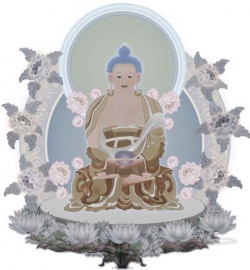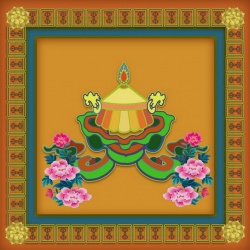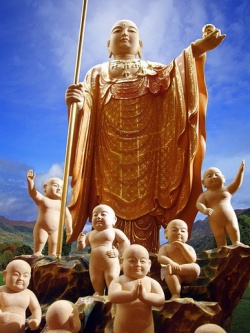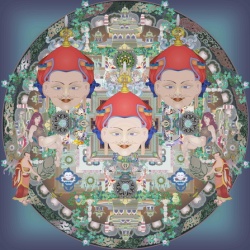Sakka, ''St. Michael,'' Lord of the 33
SPACE, Earth - Sakka Magha of Macala, King of the near Earth orbit Devas (Devanam-Indo), is the world's most famous extraterrestrial Buddhist. As Indra, Indo, Maghavant, and "Saint Michael the Archangel" he appears in many forms across traditions including the Judeo-Christian Bible. There he is referred to as "St. Michael," a "son of God" (devaputra) often confounded with primary godson Christ, who tossed Lucifer (Satan) out of heaven in Christian lore. It would be more correct to say that Christianity picked up the strand of this ancient pre-Buddhist tale, popularized by the Buddha who explained many aspects of it, and modified the story to retell legends of ancient wars in the heavens.
Sakka's Titles
Because he is the "Lord" (Indo, sovereign) of Second Heaven (Tavatimsa, the Space Realm or Realm of the Thirty-Three) and because the 33 after which this world is named are lords there as well, Sakka is known as the "Lord of Lords," often literally and misleadingly translated as "king of the gods." Because he is the "king" of First Heaven (Catumaharajika, the Realm of the Four Great Kings, spanning the quadrants of the cardinal directions) and because those regents are called kings (rajas), Sakka is also called the "King of Kings."
Because he is not a human, although he can assume human guise at will, but has left this world and been reborn among the devas (beings of light), he is a devaputra (literally, "Son of God"). This does not mean God had a son; it merely means that the word "god" is being used as a loose translation for deva, and putra (lit. "son") indicates birth among devas. He is an "archangel," one reborn in heaven (sagga, the deva loka or "world of devas," any of numerous space worlds in Buddhist cosmology).
Celestial devas do not give birth. Rather, one appears "spontaneously" (fully formed without parents) in proximity to them by the workings of karma, more or less as their offspring, children, ruler, or in some cases servants. We are all potential devaputras, capable of being born among devas. Vedic Brahmanism, the ancient Indus River Valley Civilization traditions inherited by Hinduism (created by Adi Shankara only a few centuries ago), called Sakka "Indra." He had other titles such as Indo and Maghavant, but only came to be called "Sakka" by the Buddha. He was at war in "heaven" (near Earth space) with the Titans (demonized Asuras). The Buddha told us more about Indra/Sakka than was known before. Sakka appears in numerous sutras, with a whole section (the Sakka Samyutta consisting of 25 discourses) dedicated to stories about him. One of the most touching and educational is about HOW Sakka got to be Sakka.
Sakka famously asked questions of the Buddha and entered the first stage of enlightenment, stream entry, as a result (Sakkapañha Sutta). This weaves Buddhism into ancient Indian mythology/history but with innovations.
In Buddhism many names are stations in the world system more than individuals. There have been many Sakkas, many buddhas (enlightened rediscoverers and proclaimers of the Dharma), many maras (destroyers), and brahmas (creators), and others. The sutras speak mostly of those in "office" now, but mention is made of others in the past. In the past, Magha of Macala (also Maghavā, Maghavant) is called Archangel "Michael," the mythological figure famous in the West via Bible stories of his feats tossing Lucifer (Vepacitti, chief of the Asuras) out of "heaven" (Tavatimsa) because of his rebellious nature in the sight of the divine (Maha Brahma).
Magha's karma led to his rebirth as chief of the space shining ones (akasha-devas) in two worlds. The Buddha explained that the future Sakka had vowed to make merit by engaging in particularly good acts (karma, actions, deeds).
These are recorded by Buddhaghosa and Burlingame as seven lifelong vows, which having made him famous in the "heavens" are echoed in the Judeo-Christian Bible as being of preeminent importance to getting in up there, literally in advanced space worlds:
supporting mother and father
honoring elders
avoiding backbiting
living free of avarice, generous in renouncing (not clinging to but sharing) what is mine, with open hand, delighting liberality, attentive to requests for help, delighting in distributing alms
speaking the truth (honesty)
remaining free of anger
and, if anger should arise, quickly getting rid of it
What does Sakka do now?
The nicest thing about lore regarding Sakka (St. Michael) is that as he defends two heavens, he also keeps a protective eye on humans.
There are space beings among us, light beings other traditions call "angels." Sakka rules in Second Heaven and oversees First Heaven of the 31 Planes of Existence.
There he has ordered the Four Great Sky Kings of the four directions and their UFO fleets (vimana craft) to keep an eye on the human world (D.ii.207f; iii.194f). These kings and their retinues are:
Dhatarattha, East, deva messengers (Gandhabbas)
Virūlhaka, South, dwarves (Kumbhandas)
Virūpakkha, West, dragons (Nāgas)
Vessarana, North, nature protectors (Yakkhas)
They report back their finding regarding our general moral state at regular bimonthly meetings in a spaceport called the Hall of Truth. Such concern with virtue and restraint (sila) is characteristic of anyone who attains the first stage of enlightenment, because such individuals recognize the supreme value of virtue, which leads to the mind collecting (and a serene heart), which makes liberating-insight possible. The truth -- as hard as it is to believe -- is what sets one free.
These kings are mentioned (D.ii.257f) as protectors of the Buddha and his followers (DhA.ii.146; iii.96) in the Atānātiya Sutra. Sakka is, of course, a devoted follower, incapable of taking another teacher, having directly realized the Truth the Buddha made known. Sakka referred to Maha Moggallana as "brother" when the latter visited his Vejanta mansion in space and stirred partiers their to consider their transient enjoyments, the danger in craving, and their unsatisfactory life of luxury (Cula-tanha-sankhaya Sutra).
The Four Kings are recorders of the proceedings in the assemblies of the protective devas (D.ii.225). On the eighth day of the lunar half-month, they send council members into the human world to discover if humans are cultivating righteousness and virtue. On the 14th day they send their sons (putras), and on the 15th day they themselves appear in the world.
All of these visits having the same purpose: At the assembly of the devas, they submit their report to the lords of the Realm of the Thirty-Three, who rejoice or lament depending on whether humans prosper in virtue or not (A.i.142f.; more details at AA.i.376f).



